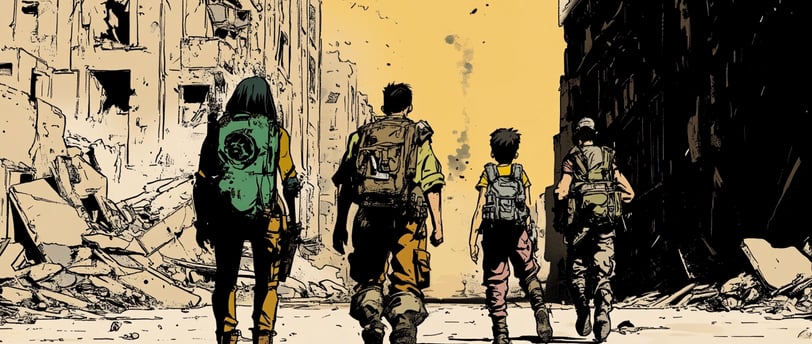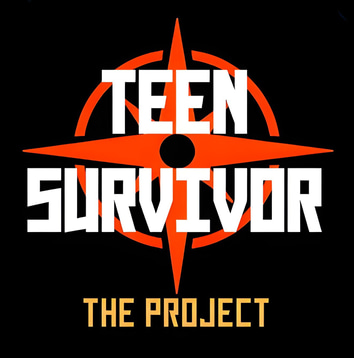Teen Leadership in World War 3: How to lead your family to safety
When faced with a global crisis like World War 3, the importance of preparation, quick thinking, and effective leadership cannot be overstated. Leadership isn’t about age; it’s about stepping up, staying calm, and guiding others when it matters most. In this guide, we’ll explore how you, as a teen, can take charge and help lead your family to safety during such turbulent times.
MINDSET AND RESILIENCELIFE SKILLS AND CONFIDENCE BUILDING
1/7/20253 min read


1. Stay Calm and Assess the Situation
In any crisis, panic is your worst enemy. Your first task as a leader is to remain composed and assess the situation.
Understand the Threat:
Ask yourself these two questions:
Is your area in immediate danger (e.g., bombings, riots, or invasions)?
Are there evacuation orders or official safety guidelines to follow?
Gather Reliable Information:
Tune into emergency broadcasts, radio stations, or trusted news outlets as soon as possible.
Avoid rumors and misinformation.
Evaluate Your Family’s Status:
Is everyone accounted for and in good health?
Take stock of your current resources like food, water, and first aid supplies.
2. Create an Action Plan
Leadership means making decisions and taking action. A clear, actionable plan can make all the difference. A simple plan is usually a good plan.
Identify a Safe Location:
Determine potential safe zones such as public shelters, a relative’s home in a safer area, or rural locations away from major targets.
Map out routes to these places, avoiding, if at all possible, highways and dangerous urban areas.
Pack Emergency Bags:
Each family member should have a bug-out bag containing essentials like:
Water (minimum 1 gallon per person approx. 3 liters ).
Non-perishable food.
A first-aid kit.
Flashlights, batteries, and power banks.
Important documents (IDs, insurance papers) stored in waterproof containers.
Establish Communication Protocols:
Decide on meeting points and how you’ll stay in touch if separated (e.g., walkie-talkies, pre-set gathering points).
3. Communicate Effectively
Clear and steady communication is essential to keeping your family calm and focused.
Be the Anchor:
Speak with confidence and clarity to reassure your family.
Break tasks into simple steps so everyone knows what to do.
Stay Updated:
Regularly check for updates on the crisis and adapt your plans accordingly.
Encourage Teamwork:
Assign roles to all family members based on their strengths. For example:
One person monitors news and alerts.
Another organizes supplies.
Someone else helps with younger siblings or pets.
4. Navigate Safely During Evacuations
If you need to evacuate, your focus should be on safety and efficiency.
Plan Your Route:
Use offline maps or GPS tools that don’t rely on internet connectivity.
Have alternative routes in case of roadblocks or unsafe conditions.
Move Quietly and Carefully:
Avoid drawing unnecessary attention to your group.
If possible, travel during times when visibility is low, such as early morning or late evening.
Keep Essentials Accessible:
Make sure your bug-out bag is packed and easy to carry.
Bring lightweight survival tools like a multitool, fire starter, and portable water filter.
5. Provide Emotional Support
Leadership isn’t just about logistics; it’s also about supporting your family emotionally.
Stay Positive:
Even if you’re scared, maintaining a positive attitude can help keep everyone else calm.
Be a Listener:
Let your family members express their fears and concerns without dismissing them.
Boost Morale:
Small acts like a kind word or focusing on what’s going well can go a long way in lifting spirits.
Give them a hug. Sometimes, it is enough.
6. Prepare Before a Crisis
Leadership doesn’t start during a crisis—it starts with preparation.
Practice Emergency Drills:
Run evacuation drills with your family so everyone knows the plan.
Learn Essential Survival Skills:
Skills like starting a fire, purifying water, and administering first aid are invaluable.
Stock Up Gradually:
Build your family’s emergency supplies over time, focusing on essentials like food, water, and medical kits.
Conclusion
In a WW3 scenario, leadership might feel like an overwhelming responsibility. But by staying calm, making clear plans, and preparing in advance, you can guide your family through even the most challenging circumstances. Remember, leadership isn’t about having all the answers—it’s about being the person who takes action when it matters most.
Start today. Discuss emergency plans with your family, practice drills, and build your survival knowledge. With preparation and determination, you can face any challenge and lead your family to safety.
Teen Survivor Project
Cheat code for young preppers
© 2024. All rights reserved.
